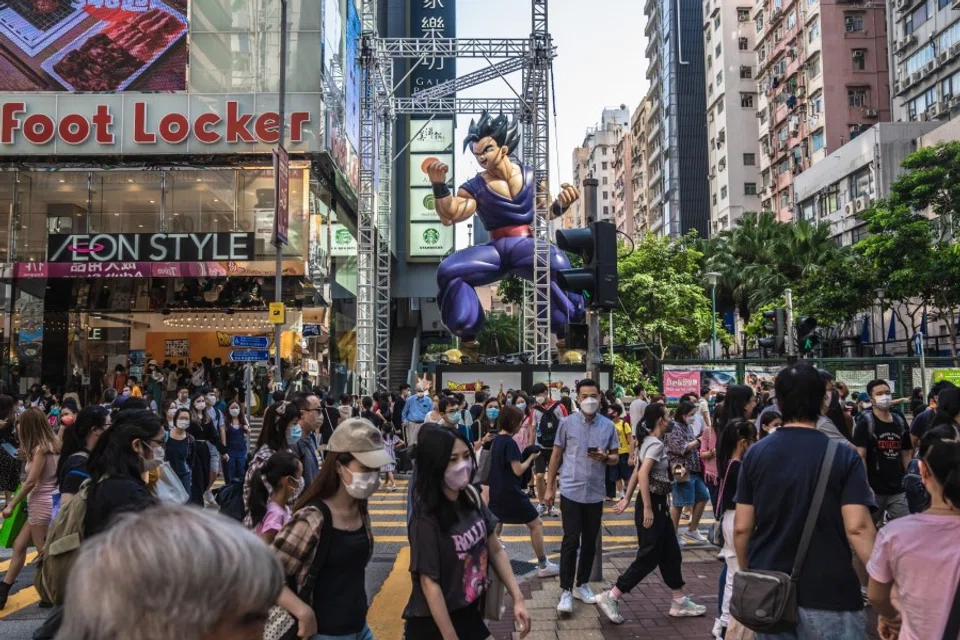Hong Kong struggles to stop brain drain
Zaobao journalist Tai Hing Shing notes that Hong Kong has seen a mass exodus of talents in recent years, and many have cited exorbitant rent, lack of growth opportunities and other factors as major causes. The brain drain in key sectors will impact the special administrative region's economic development, given the high dependence on skilled professionals. How should the authorities create opportunities and retain and attract talent?

Hong Kong has seen a mass exodus of professionals from various sectors in recent years due to the Covid-19 pandemic and the emigration wave. Suggestions to help the Hong Kong government attract talent have been put forth by many concerned parties.
Following the 2019 anti-extradition bill protests, many Hong Kongers chose to emigrate given their unease with the changes in Hong Kong's political environment amid the national security law imposed in 2020. Between late 2019 and 2021, Hong Kong had a net outflow of about 133,800 people.
Many of these emigrants are professionals. The Hong Kong government's response to a Legislative Council enquiry revealed the high turnover rate of full-time registered and enrolled nurses with the Hospital Authority, at 10% and 12.5% respectively between June 2021 and May 2022.
Hong Kong political group and think tank Path of Democracy (民主思路) suggested offering a HK$5,000 (roughly US$636) monthly housing subsidy to Hong Kong youths and mainland Chinese students in Hong Kong.
Brain drain in financial and innovative technology sectors
The situation is also prominent in areas critical to Hong Kong's development, such as finance and innovative technology. The Quarterly Report on General Household Survey of Hong Kong's Census and Statistics Department showed that in the second quarter of 2020, 214,200 people were employed in the finance sector. This figure dropped to 204,500 people in the second quarter of 2022. Similarly, 137,600 people were employed in the information and communications sector in the second quarter of 2020, but dropped to 127,000 people in the second quarter of 2022.

Faced with a serious brain drain across different sectors, Hong Kong Chief Executive John Lee said that he would propose measures to attract talent during his first Policy Address on 19 October. Over the past few months, Hong Kong society has also put forth their suggestions.
Among them, Hong Kong political group and think tank Path of Democracy (民主思路) suggested offering a HK$5,000 (roughly US$636) monthly housing subsidy to Hong Kong youths and mainland Chinese students in Hong Kong.
Angel Mak Daley, who sits on the organisation's board of governors, explained that there are over 10,000 mainland Chinese youths studying or working in Hong Kong, and many of them want to settle down in Hong Kong. But the exorbitant rents and limited space for development are driving them to return to the mainland or move overseas.
Providing a housing subsidy to Hong Kong and mainland Chinese youths who already have employment contracts or tenancy agreements could help encourage them to stay and retain talent.

Duncan Chiu, a legislative council member for the Technology and Innovation functional constituency, urged the Hong Kong government to consider leasing unoccupied lodgings for disciplinary forces and civil servants offered at special rates to top talents coming to Hong Kong; some community isolation facilities under direct government management could also be converted into apartments for technology talents.
The Hong Kong Quality and Talent Migrants Association felt that Hong Kong's high property prices were working at cross-purposes with talent development, and that "talent hostels" similar to the InnoCell co-living arrangement in Hong Kong Science Park and talent hostels in mainland China could be built.
The Hong Kong government should set up a specialised "talent development agency" to coordinate assistance for various talents... and comprehensively gather and serve talents in Hong Kong. - Hong Kong Quality and Talent Migrants Association
The association noted that over the past 20 years, over 500,000 overseas and local talents have been approved under the Quality Migrant Admission Scheme. The Hong Kong government should set up a specialised "talent development agency" to coordinate assistance for various talents; boost the nurturing of local and foreign talents; improve and simplify policies for bringing in and using talents; and comprehensively gather and serve talents in Hong Kong.

Senior lecturer Terry Yip of the Education University of Hong Kong noted that talent movement was common in the higher education sector, with many academics teaching and doing research at universities abroad. But based on his personal observation, there has been a significant increase in the number of academics leaving Hong Kong. He shared, "Many of my friends in the industry have migrated overseas in the past couple of years."
Yip added that Hong Kong lacked natural resources and was dependent on talents to lead its economic development, especially given that the eight "centres" raised in the Chinese government's 14th Five-Year Plan for 2021 to 2025 to drive Hong Kong's development require specialised talents. In the long run, the loss of talent will have a huge impact on Hong Kong's development. (NB: The 14th Five-Year Plan proposed eight "centres" for Hong Kong in the fields of finance, trade, shipping, aviation, legal and dispute resolution, innovation, intellectual property trading, and artistic and cultural exchange.)
Need to retain local talent while attracting foreign talent
Yip suggested that the Hong Kong government could emulate other countries in grading overseas universities, such that talents with specialisations or university qualifications that met certain grades would get special work visas in Hong Kong.
The authorities could also set up specialised teams to follow up on niche talents, especially those deemed to be of the right fit with Hong Kong's long-term development plans.

However, Yip also emphasised that besides attracting foreign talent, it was important for the authorities to think of ways to retain local talent. Besides political considerations, there was usually only one factor affecting specialised talents' decision to stay in Hong Kong - room for growth.
He said, "Helping the people build their assets has always been the best way to settle public sentiment. The Hong Kong government needs to think about how to resolve bread and butter issues such as housing, so that these Hong Kongers will stay in Hong Kong with peace of mind."
Related: One country, two systems: Can Hong Kong hold on to its characteristics? | Have Hong Kong migrants in the UK never left Hong Kong? | 25 years after the handover: The 'end for Hong Kong' or just the beginning? | Overhaul of Hong Kong's electoral system: Is it still 'one country, two systems'? | Singapore vs Hong Kong: Who will benefit more with greater legal market opportunities from US-China competition?





![[Photos] Fact versus fiction: The portrayal of WWII anti-Japanese martyrs in Taiwan](https://cassette.sphdigital.com.sg/image/thinkchina/3494f8bd481870f7c65b881fd21a3fd733f573f23232376e39c532a2c7593cbc)